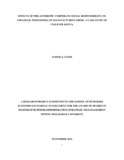EFFECTS OF PHILANTHROPIC CORPORATE SOCIAL RESPONSIBILITY ON STRATEGIC POSITIONING OF MANUFACTURING FIRMS: A CASE STUDY OF UNILEVER KENYA.
Abstract
Philanthropic Corporate Social Responsibility (CSR) as a common business practice has only recently established a foothold in developing countries. Every business takes birth, survives and grows with the consent and co-operation with the society. The society provides inputs to the business and accepts its outputs. Naturally the business owes everything to the society. Philanthropic Corporate Social Responsibility denotes organizations’ willingness to take responsibility and accountability for the effects of their activities and decisions. It is concerned with how companies manage the business processes to produce an overall positive impact on society. It is against this background information that the study sought to determine the effect of Philanthropic Corporate Social Responsibility on strategic positioningof Unilever Kenya. The study was guided by the following objectives: to assess the effect of Environmental Philanthropic CSR activities; to analyzethe effects of Educational Philanthropic CSR activities; to establish the effects of Humanitarian Philanthropic CSR activities and to find out how health f Philanthropic CSR activities influence the Corporate Strategic Positioning of Manufacturing firms a case study of Unilever Kenya. The target population was 19,318 residents of Soweto ward of Kibera slums in Kenya. Simple random sampling technique was used in selecting 99respondents. Questionnairewas used as data collection instrument. Data was analyzed using both qualitative and quantitative analysis. Descriptive statistics was used tosummarize data. Further inferential statistics techniques were used to draw comparisonsand make conclusions of the data analyzed. Chi-Squarewasemployedin analyzing the relationship between the dependent and independent variables. Bivariate correlation analysis was also used to test for measures of association between variables whereas multiple linear Regression model was used to examine the way a number of independent variables relate to one dependent variable. The SPSS software was used in analyzing descriptive and inferential statistics. Correlation results revealed that Humanitarian PCSR exhibited the strongest association with Corporate Strategic positioning followed by Environmental PCSR, Educational PCSRand lastly Health Philanthropic PCSR. The multiple linear regression models could explain for approximately 52% of the variation in the dependent variable by the variation in the independent variables on corporate strategic positioning of Unilever Kenya. The study concluded that PCSR activities not only enhances a corporation’s reputation but also influences incumbent customers to make decisions in the community thus increasing organizational attractiveness and firm familiarity, PCSR acts as an external marketing and communication function and thatPCSR affects community’ identification with their corporation. The study recommended that Unilever Kenya should fully integrate its PCSR initiatives into its corporate perspectives and operations.

